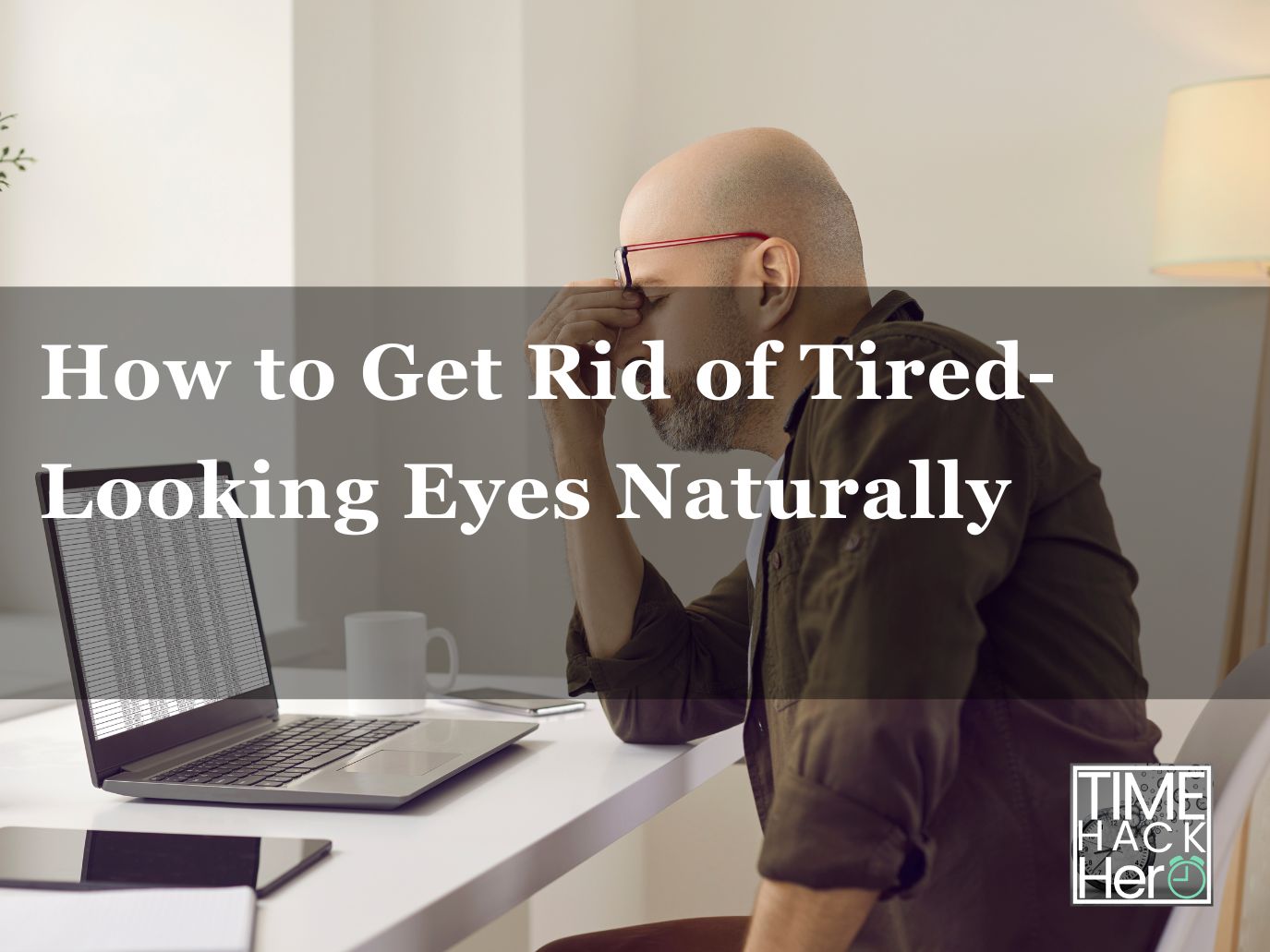The skin around the eyes is very thin and delicate, making it prone to showing signs of aging and fatigue faster than other areas. Things like lack of sleep, allergies, nutrition, and genetics can all contribute to puffy, sagging skin and dark circles that add years to your appearance.
Making matters worse, tired eyes draw more attention to perceived flaws because of their central location on your face. Even minor puffiness and discoloration around the eyes is more noticeable.
While cosmetics can temporarily mask the issue, the best approach is learning ways to treat the root causes and prevent tired eyes from developing in the first place. With some simple natural solutions, you can minimize eye bags, brighten dark circles, reduce wrinkles, and achieve a well-rested, youthful look.
Table of Contents
Is This Normal?
Before exploring solutions, it helps to understand what causes tired-looking eyes so you can address the specific factors relevant to you. According to the American Academy of Ophthalmology, eye bags and dark circles are very common, especially as we age.
While tired eyes are usually harmless, if you notice significant swelling, bulging eyes, or vision changes, see your doctor to rule out thyroid disease or other medical issues. But in most cases, the culprit is simply vascular, environmental, and lifestyle factors.
4 Reasons Your Eyes Can Look Tired
There are a few primary ways our eyes take on a fatigued appearance:
1. Eye Bags/Puffy Eyes
Eye bags refer to puffy or swollen skin under the eyes. This swelling is often caused by:
- Fluid buildup (edema) from high sodium intake, allergies or lack of sleep
- Aging orbital fat pads sagging due to loss of collagen
- Dilated lower eyelid vessels allowing blood to pool underneath
2. Dark Circles
Dark circles are caused by:
- Enlarged and congested blood vessels showing through thinner eyelid skin
- Excess melanin deposition creating darker pigmentation
- Shadows cast by puffy eyelid skin sagging over the orbital bone
3. Wrinkles/Fine Lines
Wrinkles and fine lines around the eyes form over time due to:
- Degradation of collagen and elastin fibers in eyelid skin from sun exposure and aging
- Chronic muscle movements like squinting and rubbing
- Lower skin elasticity and moisture from oxidative damage and inflammation
4. Eyelid Laxity
Drooping eyelids that make eyes appear tired develop as:
- Orbital fat moves forward, causing eyelid skin to stretch
- Muscle weakens with age, impacting ability to open eyes fully
- Nerves may become damaged due to diabetes, thyroid disorders, or stroke
Effects of Looking Tired
Having puffy, discolored skin around our eyes not only makes us look older and drained, but can also impact how others perceive us more broadly.
Even though it’s not intentional, research shows people make negative judgements when they see tired-looking eyes and eye bags.
A study published in the journal Social Psychological and Personality Science found that subjects rated people with dark circles and eye bags as being more unhappy, less agreeable, less conscientious, less attractive, and less healthy.
Participants also perceived those with prominent tired eyes as having poorer job performance and leadership skills. The effects were consistent even when showing the same faces with and without eye bags digitally added.
So while aging naturally or occasional late nights are no reason for shame, the way tired eyes change how the world sees us is worth considering. Using remedies to refresh and minimize eye fatigue can help put your best face forward.
Ways to Fix Tired-Looking Eyes
Now that you know what causes tired eyes and how they impact appearance, here are some of the most effective natural solutions to reduce eye bags, lighten dark circles, smooth fine lines, and look well-rested.
1. Get Enough Sleep
One of the best ways to banish tired eyes is getting adequate sleep consistently. Shoot for 7-9 hours of quality sleep per night. Going to bed and waking up at consistent times to align with your circadian rhythm also helps.
To improve sleep:
- Avoid blue light exposure before bedtime
- Unwind with a warm bath or light yoga
- Create an ideal sleep environment – cool, dark and quiet
- Don’t eat within 2-3 hours of bedtime
- Limit alcohol and caffeine at night
2. Reduce Allergies and Irritants
Seasonal allergies are a common culprit behind fluid retention and irritation around the eyes. To minimize allergic reactions:
- Take daily antihistamines when pollen counts are high
- Use preservative-free saline drops to flush out irritants
- Limit exposure and wear wraparound sunglasses outdoors
- Reduce dust mites in your home with hypoallergenic covers and regular cleaning
3. Cool Compresses
Applying something cold can quickly de-puff eyes by constricting blood vessels, reducing circulation under the eyes. It also helps with allergy-related inflammation.
- Soak two washcloths with ice water and apply for 10-15 minutes
- Place cold spoons or cooled tea bags on closed eyelids
- Use cooling eye masks, like those kept in the fridge
- Apply cucumber slices – contains antioxidants and mild astringent properties
4. Massage
Gently massaging around the orbital bone can help with lymphatic drainage and fluid buildup. It also stimulates collagen production.
Use ring fingers to lightly massage from inner corners outwards using small, circular motions. Repeat for 1-2 minutes per eye daily.
5. Hydrate Inside and Out
Dehydration leads to slower lymphatic circulation. Be sure to drink adequate water daily for proper fluid balance. Herbal teas are great too.
Moisturize the eye area day and night with a rich eye cream containing hyaluronic acid. Look for creams containing antioxidants to nourish skin.
6. Brightening Eye Drops
Eye drops containing soothing and brightening ingredients like vitamin C, caffeine, and niacinamide can temporarily minimize the appearance of dark circles and eye bags. Use as needed when eyes look tired.
Avoid products that contain harsh preservatives like benzalkonium chloride that could further irritate eyes.
7. Vitamins and Supplements
Ensure you’re getting enough essential vitamins and omega fatty acids through your diet and supplementation as needed:
- Vitamin C – Boosts collagen production and has antioxidant effects
- Vitamin E – Protects eye skin from oxidative damage
- Vitamin K – Improves clotting to prevent dark circles from vessels
- Omega-3s – Reduces inflammation and improves circulation
8. Sun Protection
Chronic sun exposure is one of the biggest contributors to premature aging around the delicate eye area. Always wear sunglasses and apply SPF 30 (or higher) sunscreen daily.
Invest in sunglasses with total UV protection and wear them any time you’re outside. Look for wraparound styles that protect from all angles.
9. Manage Stress
Chronic stress releases glucocorticoid hormones that can break down collagen over time. Carve out time each day to relax, like taking a walk, reading, meditating, or enjoying a warm bath. This helps reduce cortisol levels.
Building stress coping mechanisms and having a strong social support system also buffer the impacts of life’s daily stressors.
10. Healthy Lifestyle
Adopting overall healthy habits gives your body the nutrients and rest it needs to rejuvenate eyes and skin. Be sure to:
- Eat a nutrient-rich diet with antioxidants
- Stay hydrated and limit alcohol/caffeine
- Don’t smoke
- Exercise regularly
- Get 7-9 hours of quality sleep per night
Conclusion
Tired, aging eyes don’t have to be an inevitable part of growing older. By identifying the factors causing your puffiness, dark circles, or fine lines and taking strategic action, you can achieve a more revived, youthful eye appearance naturally.
Make lifestyle changes like getting adequate sleep, protecting your eyes from the sun, reducing stress, and eating a nutrient-rich diet. Use simple home remedies like cool compresses, massage, and moisturizing eye creams consistently. Within a few weeks, you should notice results.
While genetics do play a role, proactively addressing root causes and using natural solutions can minimize tired eyes. Take a holistic approach to refresh the sensitive skin around the eyes and put your best face forward.
Frequently Asked Questions
What vitamin deficiency causes dark circles under eyes?
Iron deficiency or vitamin K deficiency are common nutritional causes of dark under eye circles. Ensure you eat plenty of leafy greens, beans, and other foods rich in iron and vitamin K.
Are eye bags permanent?
Eye bags due to age-related fat pad bulging and thinning eyelid skin tend to be permanent in most cases. However, improving diet, sleep, and hydration can sometimes reduce mild temporary fluid retention causing bags.
At what age do under eye bags appear?
Eye bags can start developing as early as in your 20s due to genetics, allergies, and lifestyle habits. They tend to worsen in your 30s and beyond as collagen declines and orbital fat pads shift with age.
Why do my eyes get puffy when I sleep?
Fluid accumulation under the eyes often worsens overnight during sleep because lying flat allows fluid to drain and pool in the lower eyelid area. Lack of sleep also leads to fluid retention. Keeping your head slightly elevated can help.
How can I tighten my eyelid skin?
Using firming eye creams with collagen-boosting ingredients like retinol and vitamin C can help tighten sagging eyelids over time. Chemical peels and laser treatments are also effective for significantly loose skin.









